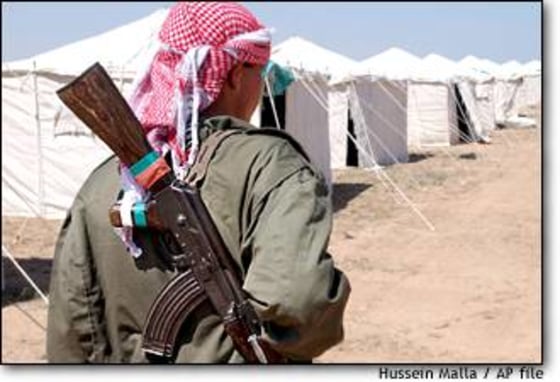Top administration officials and President Bush have issued blunt warnings to Syria not to harbor fleeing Iraqi leaders and are accusing Damascus of developing chemical weapons. But with U.S. forces engaged in a long-term effort to rebuild Iraq and given strong French and Russian ties to Syria, don’t expect American troops to launch an invasion.
According to the Pentagon, the tactical military campaign against Saddam Hussein’s regime is all but over. To be sure, we can expect small firefights, ambushes and an occasional suicide bomber, but Washington says the heavy lifting is finished.
As if to underscore the point, two aircraft carriers, the Kitty Hawk and the Constellation, are to leave the theater of operations shortly, and B-1 and B-2 bombers are already departing the island of Diego Garcia in the Indian Ocean for home bases.
What remains is a jumble of difficult tasks, all of which must be accomplished before American troops leave Iraq. Among them are the restoration of order, civil services and Iraqi public confidence, and these will require American troops, patience and coalition building.
The stubborn nature of these jobs became evident Tuesday when the dominant anti-Saddam Shiite group boycotted the first meeting designed to organize an Iraqi government. A long road lies ahead, it would appear.
FLOGGING DAMASCUS
But the most startling development is the public flogging given to Syria by Donald Rumsfeld, Colin Powell and President Bush. Accusing the Syrians of harboring Iraqi regime fugitives and of developing weapons of mass destruction, all three told the Syrians categorically to knock it off.
Although the Syrians deny everything, we appear to be quite sure of our facts. There is, for example, plenty of evidence that some members of Saddam Hussein’s family, including his wife, are in Damascus, and others of his regime’s leadership have been captured near the border. Hard evidence of weapons of mass destruction is not publicly available, but there are films released of quite a few suspicious-looking sites.
Syria has long been a Russian client state, and the Syrian armed forces, numbering more than 300,000, have Soviet-era weapons, including Frog-7 and similar surface-to-surface missiles. The Syrian troops are the best trained in the Arab world and have had significant experience in Lebanon. But they are no match for American power, if it came to that.
We seem to be moving heavy U.S. units to Iraq’s north, and the assumption has always been that they were for use in performing security missions and restoring order there. At least one brigade of the U.S. 4th Infantry Division reportedly was due near Baghdad on Tuesday, with another to follow, and the U.S. 1st Armored Division may be arriving in Iraq soon as well. The word is that the 4th Infantry Division will continue to Tikrit and assume the urban duties of the 1st Marine Expeditionary Force.
But heavy units like these are ill-suited to urban combat and police activities — those missions are best accomplished by lighter forces like the 101st Airborne, the 82nd Airborne and the Marines, all of which are performing these duties now. So one is drawn to the conclusion that these heavy units are really for use in the countryside, near the Syrian border.
The increasing mass of American troops notwithstanding, it is difficult to envision how we intend to enforce the threats we’ve made against Syria. While one can posit reconnaissance-in-force missions along the border, in which we look for and then destroy or capture enemy men and materiel, deep forays by large formations of American armor into Syrian territory seem only remotely possible. If there are suspected caches of weapons buried near the Iraqi-Syrian border, we will use the earth-moving equipment of heavy engineer units to bring them up.
But if Americans do enter Syria, it is more likely that these will be special operations forces; indeed, it is probable that special missions are already under way inside Syrian territory.
However, even if Iraqi fugitives are already in Damascus and Syrian President Bashir al-Assad continues to lie about his possession of weapons of mass destruction, it seems very unlikely that we will unleash American might on the Syrian army. For one thing, we have already seen that armed force does a very poor job of finding individual miscreants and offending weapons.
SYRIA’S EUROPEAN FRIENDS
For another, although the Bush administration is fairly insensitive to international opprobrium, any invasion of Syria would be accompanied by even greater outcry than the response to the Iraq invasion. The American threshold for pain may be much lower, no matter what the justification for action against Syria: Saddam Hussein’s well-publicized smugness was irritant enough to motivate Americans to support an effort against him, while al-Assad is a virtual unknown here. Without incontrovertible evidence of a threat, it is hard to see Americans lining up to support an adventure in another Arab country.
So, why make such a racket about the Syrians? Maybe we have intelligence we are willing to publish worldwide, perhaps so compelling that we think it will motivate the rest of the international community to force the Syrians to give up their weapons. But, with Russia and France actively supporting the Syrians for decades, and European concern about American hegemony in the Middle East, don’t look for this tack to be very successful.
(Retired U.S. Army Col. Jack Jacobs is a military analyst for MSNBC.)
